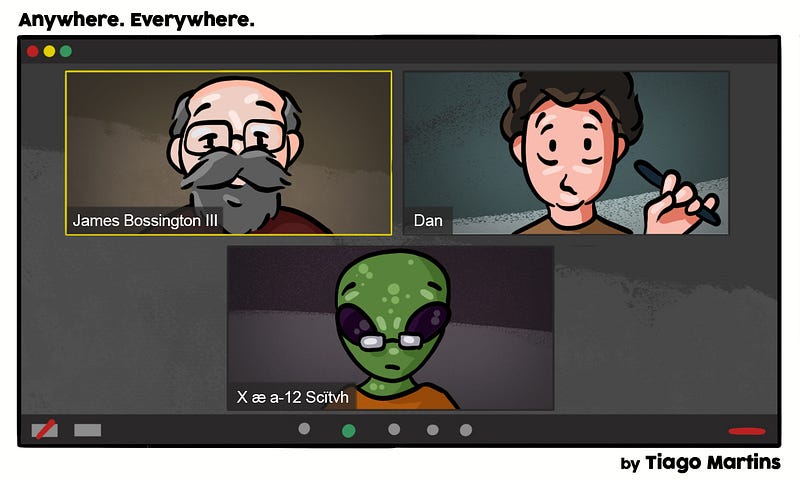
Marc Andreessen is right: software is (still) eating the world. The biggest change in the economics of companies has been — and will continue to be for a long time — the proper and growing usage of Information Technology.
Successful companies are the ones that are better able to generate economies of scale. Economies of scale need software. And software needs Tech Talent (henceforth just ‘talent’).
Hence, successful companies need talent. But talent is hard to get. And it will only get harder as time goes on.
To get the talent, companies need to spend growing sums in Tech Recruiters (one of the fastest-growing job categories in the last two years), ATSs, and all types of external recruiting services. This is getting expensive. A lot.
After finding the right talent, companies put them in payroll, and assign them to a team or project, managed internally. The fixed structure costs (just to allow for centralized work management practices) are a burden, and as much as ‘agile’ is mentioned in the project or team memos, this setup leads productivity to a declining trend. More metrics, reports, memos, and procedures are created, usually with the sole result for a false illusion of control and a bigger focus on task completion than the objective impact on business results. Kind of a Dilbert effect (and I’m not referring to the laughs we get out of the comic strips).
Meanwhile, talent either gets accommodated to this state of affairs and reduces their creativity, autonomy, and accountability to the minimum possible levels, or they just get tired of it and still have it in them to leave the company.
And there the company goes looking for more talent, probably increasing the budget for talent acquisition and so on.
To make it all more difficult we have Covid-19, and suddenly the previously alternative international talent source dries up: no more relocations. Even inside the same country, people find it difficult to accept a job in a different place than the one they live in.
But there seems to exist an alternative: full remote work. We were all forced to do it anyway, so why not take a leap of faith and re-open the whole world as a source of talent? After all, the world is big, and there are lots of people everywhere, probably even costing less than local talent.

Question is that only a low number of companies are ready to go full-remote. Most full-remote companies were born that way, not evolved into it.
Some of the main challenges of going full remote:
- Sourcing and selecting the right talent is more difficult online, especially when going for different cultures. A false positive comes more often, and with a big cost;
- Talent onboarding is much more difficult, not just because of the lack of a physical presence, but because cultural alignment is harder to do online;
- A fully remote/distributed teamwork is just more difficult to manage because human communication and coordination are…well… human and not everyone is good working on the ‘online async work paradigm’ nirvana;
- Time Zones, culture and language can also be a real problem;
- Full-remote doesn’t solve the problem of needing to grow the operational management resources to manage talent as the team grows (in reality it aggravates it, due to higher payrolling complexity);
- Full-remote employees tend to have lower levels of commitment to the company, thus increasing turnover (and hiring costs);
- Talent working full-remote tends to suffer more from isolation, demotivation, and mental health problems. And, very relevant, a Stack Overflow 2019 survey found out that 57,9% of the respondents prefer to work in an office.
So, how to break the code? How can both perspectives, Full-office vs Full-Remote, be mixed to create the better of both worlds?
The answer is Distributed Teams.
A Distributed Team is composed of 4 to 7 tech talents working remotely for a client company, in a local office setup (for example, a Portuguese Network Team working in an office in Porto for a British company).
These teams are led by a strong Team Leader that interfaces with the company and assures people and work management, including hiring, onboarding, assessment, payroll, etc. The Distributed Team members don’t need to have any formal contract with the client company.
A Distributed Team starts by the company selecting a Team Leader and defining the charter for the team (turn-key projects, time & materials, goals, functions, projects, team profiles, company work and communication procedures, and standards, etc). The Team Leader staffs the team members and assures work is being done and delivered. If a team member is not performing or leaves, the Team Leader handles the replacement. She has incentives to have the best team she can get, and the client company does not have to worry about it.

At the end of the month, the company client is billed for the team as a whole, without any complications. Contracting Distributed Teams in countries with lower wages is a sought-for option, as it can greatly optimize costs.
Talent in these teams has the benefits of working together in an office close to their homes (not necessarily in big cities), or even remote in some cases, improving their motivation, sense of belonging and commitment.
If the Distributed Team stops making sense, or performance is inadequate, the contract is terminated, no more bills, no strings attached.
Scaling up a level, a Manager in the client company can lead, ideally, up to 7 DistributedTeams, i.e, up to 49 employees without needing any extra office space.
Concluding, a summary of Distributed Teams benefits:
- The attraction of the right talent wherever it is;
- A more flexible and productive approach to work management;
- Reduction of recruitment, work, management, and office costs;
- Change from a fixed cost to a variable cost approach;
- Ability to flexibility scale tech talent to meet company needs.
Keeping office-centricity will not be enough to have the talent you need to scale your business. And not all companies will go full-remote (will yours?).
Are you willing to grasp the power of Distributed (Teams)?
Our very own Distributed Teams Conference is happening on 15–17 June. This remote event will be filled with insights and discussions from handpicked speakers about distributed teams, people management, culture & communication, workspaces, and so much more.
Will you join us? Looking forward to seeing you there!
Pedro Moura
Head of Talent @ Landing.Jobs






0 Comments